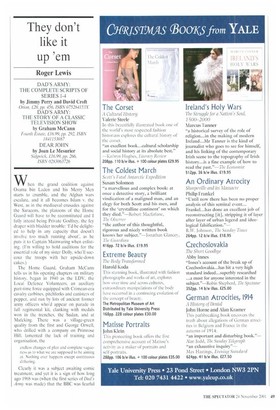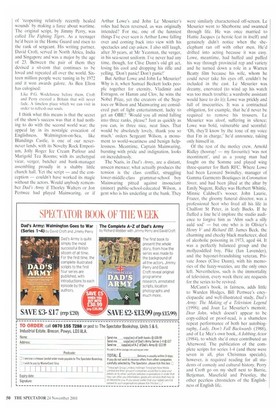They don't like it up 'em
Roger Lewis
DAD'S ARMY: THE COMPLETE SCRIPTS OF SERIES 1-4 by Jimmy Perry and David Croft Orion, 120, pp. 456, ISBN 075284153X DAD'S ARMY: THE STORY OF A CLASSIC TELEVISION SHOW by Graham McCann Fourth Estate, £16.99, pp. 292, ISBN 1841153087 DEAR JOHN by Joan Le Mesurier Sidgwick, £16.99, pp. 266, ISBN 0283063726 W hen the grand coalition against Osama bin Laden and his Merry Men starts to crumble, and the Afghan wars escalate, and it all becomes Islam v. the West, as in the mediaeval crusades against the Saracens, the platoons of the Home Guard will have to be reconstituted and 1 fully intend being Private Godfrey, the fey draper with bladder trouble: 'I'd be delighted to help in any capacity that doesn't involve too much running about', as he puts it to Captain Mainwaring when enlisting. (I'm willing to hold auditions for the essential role of' my sister Dolly, who'll succour the troops with her upside-down cakes.)
The Home Guard, Graham McCann tells us in his opening chapters on military history, began in 1940 as the LDV, the Local Defence Volunteers, an auxiliary part-time force equipped with Crimean-era cavalry carbines, pitchforks and canisters of pepper, and run by lots of ancient former army officers who'd appear on parade in full regimental kit, clanking with medals won in the trenches, the Sudan, and at Mafeking. There was a village-green quality from the first and George Orwell, who drilled with a company on Primrose Hill, lamented the lack of training and organisation, the endless changes of plan and complete vagueness as to what we arc supposed to be aiming at. Nothing ever happens except continuous dithering..
Clearly it was a subject awaiting comic treatment, and yet it is a sign of how long ago 1968 was (when the first series of Dad's Army was made) that the BBC was fearful
of 'reopening relatively recently healed wounds' by making a farce about wartime. The original script, by Jimmy Perry, was called The Fighting Tigers. As a teenager he'd been in the Home Guard and risen to the rank of sergeant. His writing partner, David Croft, served in North Africa, India and Singapore and was a major by the age of 23. Between the pair of them they devised a sit-corn that continues to be loved and repeated all over the world. Sixteen million people were tuning in by 1972 and it won awards galore. As Ben Elton has eulogised:
Like P.G. Wodehouse before them, Croft and Perry created a Britain that will never fade. A timeless place which we can visit in order to refresh our souls.
I think what this means is that the secret of the show's success was that it had nothing to do with the second world war; the appeal lay in its nostalgic evocation of Englishness. Walmington-on-Sea, like Blandings Castle, is one of our nevernever lands, with its Novelty Rock Emporium, Jolly Roger Ice Cream Parlour and Marigold Tea Rooms; with its archetypal vicar, verger, butcher and bank-manager assembling proudly in a shabby little church hall. Yet the script — and the conception — couldn't have worked its magic without the actors. Would anybody remember Dad's Army if Thorley Walters or Jon Pertwcc had played Mainwaring, or if Arthur Lowe's and John Le Mesurier's roles had been reversed, as was originally intended? For me, one of the funniest things I've ever seen is Arthur Lowe falling over and coming back into view with his spectacles and cap askew. I also still laugh, after 30 years, at Mr Yeatman, the verger, in his sea-scout uniform. I've never had any time, though, for Clive Dunn's old git act, losing his cool and dropping his rifle and yelling, 'Don't panic! Don't panic!'
But Arthur Lowe and John Le Mesurier! Why is it, when Samuel Beckett locks people together for eternity, Vladimir and Estragon, or Hamm and Cloy, he wins the Nobel Prize, yet the creators of the Steptoes or Wilson and Mainwaring are considered part of light entertainment, lucky to get an OBE? 'Would you all mind falling into three ranks, please? Just as quickly as you can, in three nice, neat lines. That would be absolutely lovely, thank you so much,' orders Sergeant Wilson, a monument to world-weariness and benign helplessness. Meantime, Captain Mainwaring, bursting with pride and indignation, looks on incredulously.
The Nazis, in Dad's Army, are a distant, unseen menace; what actually produces the tension is the class conflict, struggling lower-middle-class grammar-school boy Mainwaring pitted against insouciant (minor) public-school-educated Wilson, a gent who is his underling at the bank. They
were similarly characterised off-screen. Le Mesurier went to Sherborne and swanned through life. He was once married to Hattie Jacques (a heroic feat in itself) and genuinely didn't notice when the sheelephant ran off with other men, He'd drifted into acting because it was easy. Lowe, meantime, had huffed and puffed his way through provincial rep and variety and he turned down a role in a Warren Beatty film because his wife, whom he could never take his eyes off, couldn't be included in the cast. Le Mesurier was dreamy, enervated (to wind up his watch was too much trouble; a wardrobe assistant would have to do it); Lowe was prickly and full of insecurities. It was a contractual obligation, for example, that he'd never be required to remove his trousers. Le Mesurier was aloof, suffering in silence; Lowe was bold, vulnerable and scornful: 'Oh, they'll know by the tone of my voice that I'm in charge,' he'd announce, taking only himself in.
Of the rest of the motley crew, Arnold Ridley (hooray! — my favourite) 'was not incontinent', and as a young man had fought on the Somme and played wing three-quarter for Bath RFC. Where Lowe had been Leonard Swindley, manager of Gamma Garments Boutiques in Coronation Street, and had been jilted at the altar by Emily Nugent, Ridley was Herbert Whittle, Minnie Caldwell's wooer. John Laurie, Frazer, the gloomy funeral director, was a professional Scot who lived all his life in Chalfont St Peter, in leafy Bucks. If he fluffed a line he'd implore the studio audience to forgive him as 'Ahm such a silly auld sod' — but one who is in Olivier's Henry V and Richard III. James Beck, the charming and cheeky black marketeer, died of alcoholic poisoning in 1973, aged 44. It was a perfectly balanced group and the mollycoddled boy, Pike (Ian Lavender), and the bayonet-brandishing veteran, Private Jones (Clive Dunn), with his memories of the fuzzy-wuzzies, are the only ones left. Nevertheless, such is the immortality of television, every week there are requests for the series to be revived.
McCann's book, in fairness, adds little to Warden Hodges, Bill Pertwee's encyclopaedic and well-illustrated study, Dad's Army: The Making of a Television Legend (1998); and Joan Le Mesurier's memoir, Dear John, which doesn't appear to be copy-edited or proof-read, is a shameless repeat performance of both her autobiography, Lady, Don't Fall Backwards (1988), and of Le Mez's own book, A Jobbing Actor (1984), to which she'd once contributed an Afterward. The publication of the complete scripts for series 1-4 (and there were seven in all, plus Christmas specials), however, is required reading for all students of comedy and cultural history. Perry and Croft go on my shelf next to Barrie, Betjeman. Masefield and Priestley, the other peerless chroniclers of the Englishness of English life,



















































































 Previous page
Previous page